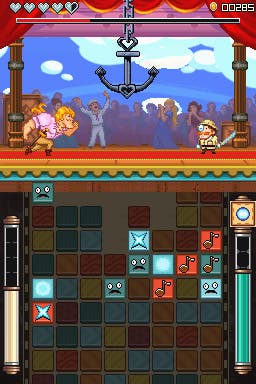Henry Hatsworth in the Puzzling Adventure
Mental blocks.
There's a limit to the amount of time you can spend in the puzzle, which adds an extra layer of strategy and decision-making. Do you go for that much-needed heart, or get rid of those enemies first? Would it be smart to save those power-ups for when you have to face the boss?
The time limit can prove irritating, especially at first. Often you'll get caught up in the action on the top screen, only to find you've neglected the puzzle for too long and are under attack from a ton of blocks. Or, you might be about to pull off an amazing block-matching combo you've planned over the course of several moves, only to be kicked out of the puzzle because you're out of time. It feels like you can't ever really get stuck into either game.
However, as things progress, switching between the two becomes more automatic. Plus you start to understand how the timing of your switches can help or hinder you, and to develop new strategies. It's still frustrating when you're forced to change your focus at key moments, but this happens less often as your multi-tasking skills improve.
So sticking a platformer on top of a puzzler does create an additional gameplay element. But is it such an original idea?
The most obvious comparison to Henry Hatsworth in the Puzzling Adventure is Professor Layton and the Curious Village. They're both DS games starring similar main characters (Hatsworth is referred to as "Professor" in-game, if not on the box) with boy sidekicks, who go round solving puzzles.

But there are some fundamental differences. Level-5's game is a point-and-click adventure bundled with a load of logic problems, not a platformer stuck on a Bejeweled clone. But it's hard to believe EA didn't look at Professor Layton's success and decide it wanted a piece of the action; the press release even describes Henry Hatsworth as "indie-inspired".
The other difference is that Henry Hatsworth has nowhere near the charm or intellect of Professor Layton. It doesn't have those soft sepia visuals or that storybook feel; it's sharp, shiny and futuristic. The gameplay in both the puzzle and adventure elements is much more fast-paced, and more about quick reflexes rather than logic and brainpower.
Which means Henry Hatsworth will have more appeal for some people. Not everyone wants to spend hours working out how to get the third wolf across the river without the other two eating the chickens; sometimes you just want to blow a load of blocks up or put on a robot suit.
However, while the platformer and the puzzler in Henry Hatsworth are perfectly competent, they're nothing special. Neither could be described as classic examples of their genre, and neither offer anything new. The switching mechanic does add interest, but not quite enough to make Henry Hatsworth in the Puzzling Adventure a great game. If you just can't get enough Bejeweled and don't mind a decent 2D platformer now and again though, it's fun.








